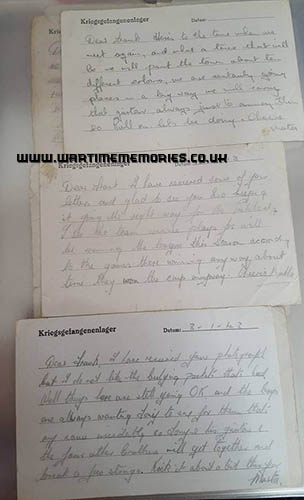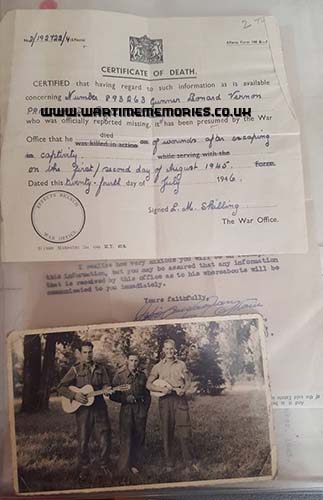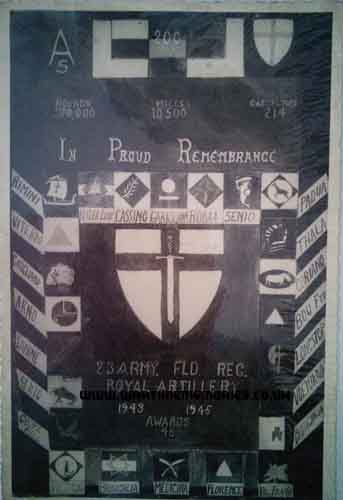Gnr. Daniel Stevens 23rd Field Regiment Royal Artillery
Account of the retreat to St Valery and surrender of British troops on 12th of June 1940 and the movement of the prisoners of war from St Valery to Thorn in Poland, by Gunner Daniel Stevens
Daniel Stevens 15990 P.O.W Germany 1940-1942
Dan Stevens, Denmere, Liswerry Road, Newport, Monmouthshire
Rank Specialist 89/90 Field Battalion Royal Artillery, 23rd Field Regiment, Royal Artillery
was Recalled to the Colours on 15th of August 1939 and went to France on 1st of October 1939.
First leave 5th of April 1940 to 15th.
L-A.A.L.A Serv OPac GPOAC
First joined army 14th of November 1928 served with 5th Light Brigade, 1st Light Brigade, 4th Medium Brigade and 89/90 Field Battalion, 23rd Field Regiment, Rank Specialist
18th of January 1940. My birthday. It has been my intention since I left my darling wife and son on April 15th or 14th rather (A Black Sunday that) to keep a diary but I was unable to procure one until now so having nothing better to do I propose to set down a few of my experiences not that this diary will benefit any one but will help to pass a few moments away during these trying days in the prison camp; dates and places are rather obscure now so my effort will be sketchy and brief.
Well after leaving England on the morning of the 15th April I arrived at Boulogne sometime during the afternoon. Three days later I've joined my unit at Merville by Amentieres. Four days later again 21st we the 51st Division left for the Maginot with a French Cal (cavalry?) Division under Weygand taking up a position in Lorraine just south of Luxemburg seven kilometres in front of the Maginot.
Here we engaged the enemy (I being O.P.AC at the time.) About the 27th of April 1940 the battle raged incessantly day and night here I found the mistake of under estimating Jerry's Artillery was very good and the Siegfried was going to be a tough nut to crack. Still the Maginot was impregnable so I had no fear that we should get the worst of this skirmish. Well May the 10th came with Jerries advance through Holland and Belgium.
This although expected was something different so moving our front north of Verdun we again held the enemy on the right flank of the French 7th Army. They, after a few days of heavy fighting, were forced to retire leaving us in rather a precarious position anyway. May the 24th the channel ports had been taken. What a shock that was. The French had let us down very badly no doubt about that. Further, our Air Force had entirely disappeared leaving us at the mercy of the German bombers. How were we to get back now? Still fighting a rear guard action we retired across France south of the Bresle. Jerry, moving south had reached the Somme. It was now or never it seemed obvious to me that they must be held on the Somme or France was lost scraping together all available men Base details (21 thousand men) and so forth we helped fill our depleted ranks and with half of the 101st Armoured Division we advanced into action along the Somme South of Abbieville. Here the most terrific battle followed we opened up with a 36 hour barrage crossed the Somme and retook Abbeville. Our success was short lived, no reinforcements, no air support and Jerry slamming in fresh Divisions outnumbered by many, many thousands we were forced back. I cannot speak too highly of the Gordons and the Black Watch, Seaforths and Argyles whom we fought with and supported in these terrific engagements. They certainly made history these days. The French by now had packed in completely broken and retiring in disorder they definitely were a nuisance. We retiring and still fighting for the second time a rear guard action day and night inflicting heavy damage on the enemy. We were drawing nearer to the coast. Rumour has it that our Division Commander was ordered to make for Le Havre and get out but this in his opinion was un-English and decided to fight on anyway. The enemy had now taken Paris and proceeding along the Seine through Rouen had reached Le Havre. We now had them behind us St Valery being the only port left, we at this time were fighting around Beauvois also at this time a Naval Command was attached to the Division. The navy were coming into St Valery to help us and save what men they could. Hope soared once again, although we knew some men must be left behind. Reaching St Valery on the night of 10th of June 1940 we or what was left of this famous Division some six thousand formed a ring around the town: the last stand. It never occurred to me that I should be taken prisoner. I had or at least I thought I might get killed. I had been extraordinarily lucky up till now. Well our last stand was a gallant affair but on the advice of the International Red Cross and order from England (after scrapping our guns and fighting side by side with the Infantry) that Command surrendered. This was the biggest blow of all. My mind was a riot. Better fight on I thought although I knew we must eventually be wiped out, we were in the forward position West of the town when cease fire went later the Divisional Commander General Fortune came and spoke to us. I felt like knocking him down. Why the hell didn't he get out sooner, him and his Knight Errant wasn't going to help us now. My dear wife and son had been foremost in my mind since I went into action. I cannot describe my feelings now, anyway I was now a prisoner much against my will and the worst experience of my life was yet to come, I have left out the hundreds of little incidents that happened during these weeks a few exciting trips into the enemy country (a day was twenty four hours excitement then) because my untrained mind could not do justice or at least record them well enough, still this is the first chapter and I shall write more later. I intend to try and write any thoughts and dreams of my dear ones at home who are my whole life.
Now my only logical thoughts are of my son and wife with whom I long day and night to be reunited with once again. I always thought I was so hard boiled. The very thoughts of how shall I put it when sentimental thoughts come in my head it nauseated me made me blush I could not even bring myself to get mushy with my wife but oh how many times since I have been a prisoner have I wished to be again with her whom I love more than anything in the world, perhaps I am getting mushy or realizing my true feelings for the first time, anyway I must put these bursts of thoughts away until I finish my Tale of the War, but I don’t seem to be able to start the tale of that terrible 21 day march through France, Belgium and Holland. Those three days on the barge could the Black Hole of Calcutta been any worse or the three days in the cattle trucks across Germany to Poland!
Easter 1942 I have just wrote a card to my sweet wife. What an empty and utterly miserable weekend this has been, memories of two years ago fill my mind this holiday, when I spent ten days leave with my loved ones and to add to this we received no Red Cross parcels for weeks and no smokes which makes life unbearable. Still the day will come when all this misery will become just a memory like that terrific march through France, Belgium and Holland – it is this hunger that we are again experiencing now that brings it back to my mind so I'll carry on with my little story.
Well after unharnessing and destroying everything of any value we march out to meet the enemy K Division SS under Rommel who after giving us an hour or so to destroy our letters and pamphlets (they knew more about us than we did) we set off on the march about 40 kilos arriving dead beat and very hungry we hadn't had a decent meal for days, anyhow still we just sank down and slept. The nights were pretty cold although the days were very hot this sort of thing carried on for some nine days long marches no food little water except what we could forage dogs, cats and the most horrible filth was eaten by the men. On this march we passed column on column of German transport coming in to man the coast would they invade the Old Country still we had no fear England wasn't France we had gone under but that wasn't England. I've often thought perhaps the people at home thought we put up a poor show on the face of it we did but actually we done exceedingly well holding far superior force with so much sabotage around us as long as we did. Well I may as well put down the names of the towns we passed through on this never to be forgotten march from St Valery on 12th of June 1940.
Fontaine Le Dun 13th
- Forges 14th
- Le Chatelain 16th
- Fouliroy 18th
- Aumale 19th
- Frevant 20th
- Doulons 21-22nd
- St Pol 23rd
- Bethune 24th
- Seclin 25th
Now Belgium
Tournai 26th
- Renaix 27th
- Ninove 28th
- Aalst 29th
- Lockeran 30th
Holland 336 walk
Zyder Zee 1, 2, 3 July
- Moerbeke
Here we went aboard a barge some thousand men I now have some idea what a slave must have been like. Rem to Dordrecht and Emerich then Emer in the Rhur. From here we were transported in cattle trucks to Poland (Thorn) 72 men being in cow trucks for some 52 hours.
I hope to go into this thousand mile journey in so much detail was the trail of 49 or Kabul to Kandahar anything like this, I have now been three years a prisoner but misery and hardship of that period still lingers in mind and body. My wife sometimes writes that I'm so cheerful in my letters I'm afraid I don't always feel that way still when I see her I shall tell her everything. What a relief that will be then I think I shall be able in some measure to forget it well enough for now, tomorrow I'll write some more. Got some snaps of my son last week must mention them as they are of so great an impact he's nearly 5 years old now and he’s a great kid. I'm very proud of him.
8th of May 1944, time has passed, a rather empty miserable period but now things seem to be coming to a head. I have followed the war closely. The allied advance on Europe the state of Germany, Russia's effect, and now the impending invasion we have a sweep (cigs) on the date of this onslaught. I pray that it will be soon and end this ghastly war, it's been a scourge to mankind, I could write so much but well I'll as I say tell her soon. It amazes me how these people have carried on just indomitable courage, a worthy foe, I hope that we may soon all be friends a much better state I fancy for the likes of me.
Footnote: This journal was well known to the family, but not read until after Dan's wife died in 2001. It has taken a further 19 years to be transcribed.
Daniel (Dan or Danny) Stevens was born in 1910 in Wolverhampton, the son of a farrier/steelworker of the same name. A gunner himself, his father fought throughout WW1 at both Gallipoli and on the Western Front, where he won the Military Medal. His mother and infant brother died in the great Flu epidemic in 1919 and his father (apparently from the effects of being gassed on the Western Front) in 1928, leaving Dan as the breadwinner for his stepmother and three young sisters. As he had lost his job in the depression, he joined the Artillery, serving for three years to 1931, requiring him to be in the army reserve for another ten years. So he was called up in 1939, before war was declared.
He returned in 1945, four stone (25Kg) lighter than when his wife last saw him in 1940. He may, as he said in his journal, have recounted his experiences to her, but he never talked about the war, apart from anecdotes to amuse his children; only becoming angry when they refused food "you should try eating mangy dogs" a comment which they never believed. He did say that he survived the march because the man in front had an enamel mug and metal teaspoon hanging from his pack. As he walked, the spoon clinked rhythmically against the mug, and Dan marched on, concentrated on the mesmerising tempo. With three of his mates they carried an injured soldier from the Black Watch in a blanket for the whole journey
He was a serial escapee, once getting to The Baltic Sea and stealing a rowing boat to get to Sweden, they were picked up by a German submarine, which is probably just as well, and once escaping to the East but stopped by a German tank whose Commander stopped to offer them a lift back West as the Russians were advancing. He said that getting out was easy, staying out was another matter. They did have a tunnel to the cookhouse, which formed the corner of the camp and had a window facing the road. They would steal food and take it down to the local village to exchange for coal, returning before morning. He respected the Germans, but was contemptuous of the French who deserted them in the fight and never washed, and had nothing good to say of the British army hierarchy. He did escape to the Russians eventually and was interned. Then he somehow got back to France before he was eventually returned to England.
He had numerous wounds and carried pieces of shrapnel in his legs for the whole of his life, dying prematurely in 1973.










